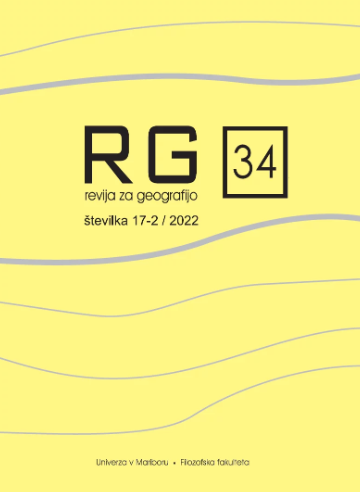The Perception of Idyllic Rural Areas in Slovenia
DOI:
https://doi.org/10.18690/rg.17.2.2736Keywords:
perceptions, idyllic countryside, rural geography, SlovenijaAbstract
The Perception of Idyllic Rural Areas in Slovenia
The transition of society from a traditional to a modern form brought changes in the structure of society and caused phenomena such as urbanization, fast pace of life and alienation, which affect changes in our value system. One of the areas that we consequently as a society are beginning to value differently is the concept of the countryside. Today's society relies heavily on industry and technology as a driver of development, which has caused the countryside to change its purpose, functions, symbolism, characteristics and identity. Modern society quite often associates the concept of the countryside with a beautiful, peaceful, clean and happy living environment that can be characterized as idyllic. The emergence of an idyllic idea of the countryside can further influence changes in the concrete rural area. The purpose of the paper is to show that the countryside can be studied as a social construct, which is influenced by the interpretation of the surroundings or wider society. We want to show the characteristics of the perception of the countryside in Slovenia, or to present the evaluation of Slovenian rural regions based on the opinion of the inhabitants of Slovenia, and to show how the social perception of space can affect the changing of various characteristics of the region and the changing pattern of behaviour of residents and visitors.
Downloads
References
Bell, D. 2006: Variations on the rural idyll. The Handbook of Rural. SAGE.
Bogataj, J. 1996: Sestavine kulturne istovetnosti (identitete) slovenskega podeželja. Anthropos, 28.
Bunce, M. 1994: The countryside ideale: Anglo-American images of landscape. Routledge.
Bunce, M. 2003: Reproducing rural idylls. Country Visions 14 (30). Pearson Education Limited.
Cloke, P. 2006: Rurality and racialized others: out of place in the countryside. The Handbook of Rural Studies. SAGE.
Drozg, V. 2002: Ohranjanje regionalne raznolikosti stanovanjske hiše v Sloveniji. Dela, 18. https://doi.org/10.4312/dela.18.449-461
Halfacree, K. 1994: The importance of “the rural” in the constitution of counterurbanization: Evidence from England in the 1980s. Sociologia Ruralis, 34(2). https://doi.org/10.1111/j.1467-9523.1994.tb00807.x
Halfacree, K. 2006: Rural space: constructing a three-fold architecture. The Handbook of Rural Studies, 44 (62). SAGE.
Halfacree, K. in Rivera, M. J. 2011: Moving to the Countryside and Staying: Lives beyond Representations. Sociologia Ruralis, 52(1). https://doi.org/10.1111/j.1467-9523.2011.00556.x
Hopkins, J. 1998: Signs of the Post-Rural: Marketing Myths of a Symbolic Countryside. Geografiska Annaler, Series B: Human Geography, 80B(2). https://doi.org/10.1111/j.0435-3684.1998.00030.x
Kaštrun, T. 2004: Vrednote prostora in okolja: 3. fazno in končno poročilo: sumarnik javnomnenjske raziskave - ankete in interpretacija rezultatov. Fakulteta za družbene vede.
Klemenčič, V. 2005: Poskus opredelitve sodobnih problemov razvoja kulturne pokrajine slovenskega podeželja. Dela, 24.
Kučan, A. 2002: Pomenska členitev nacionalnega prostora. Spoznavni zemljevid Slovenije. Znanstveni inštitut Filozofske fakultete.
Park, D. C., in Coppack, P. M. 1994: The Role of Rural Sentiment and Vernacular Landscapes in Contriving Sense of Place in the City’s Countryside. Geografiska Annaler: Series B, Human Geography, 76(3).
Píša, J. 2019: The lawn grew too quickly! Perception of rural idyll by Czech amenity migrants. GeoScape, 13(1). http://dx.doi.org/10.2478/geosc-2019-0004
Rye, J. F. 2006: Rural youths’ images of the rural. Journal of Rural Studies, 22(4). http://dx.doi.org/10.1016/j.jrurstud.2006.01.005
Short, K. 2006: Idyllic ruralities. The Handbook of Rural Studies. SAGE.
Slavič, I. P. 2002: Iskanje dodatnih virov zaslužka na podeželju: primer dopolnilnih dejavnosti na kmetijah v Sloveniji. Dela, 17. https://doi.org/10.4312/DELA.17.100-122
Slavič, I. P. 2010: Endogeni razvojni potenciali slovenskega podeželja. Znanstvena Založba Filozofske Fakultete, Oddelek Za Geografijo.
Soares da Silva, D., Figueiredo, E., Eusébio, C. in Carneiro, M. J. 2016: The countryside is worth a thousand words – Portuguese representations on rural areas. Journal of Rural Studies, 44. https://doi.org/10.1016/j.jrurstud.2016.01.012
Svendsen, G. L. H. 2004: The right to development: construction of a nonagriculturalist discourse of rurality in Denmark. Journal of Rural Studies, 20(1). https://doi.org/10.1016/S0743-0167(03)00045-7
Swaffield, S. in Fairweather, J. 1998: In Search of Arcadia: The Persistence of the Rural Idyll in New Zealand Rural Subdivisions. Journal of Environmental Planning and Management, 41(1).
Toš, N., Zajšek, Š., Splichal, S. in Malešič, M. 2020: Vrednote v prehodu XIII.: Slovenija v mednarodnih in medčasovnih primerjavah: ISSP, ESS, SJM 2017–2020. Fakulteta Za družbene vede.
Urbanc, M. 2002: Kulturne pokrajine v Sloveniji. Založba Zrc.
Uršič, M. in Hočevar, M. 2007: Protiurbanost kot način življenja. Fakulteta za družbene vede.
Van Dam, F., Heins, S. in Elbersen, B. S. 2002: Lay discourses of the rural and stated and revealed preferences for rural living. Some evidence of the existence of a rural idyll in the Netherlands. Journal of Rural Studies, 18(4). https://doi.org/10.1016/S0743-0167(02)00035-9
Van der Ploeg, J. D. in Rope, D. 2003: Multifunctionality and rural development: the actual situation in Europe. V Multifunctionality and rural development: the actual situation in Europe. Ashgate.
Van der Ploeg, J. D., Renting, H., Brunori, G., Knickel, K., Mannion, J., Marsden, T., de Roest, K., Sevilla-Guzman, E. in Ventura, F. 2000: Rural Development: From Practices and Policies towards Theory. Sociologia Ruralis, 40(4). https://doi.org/10.1111/1467-9523.00156
Virant, Z. 2022: Predstava o idiličnem podeželju v Sloveniji kot gonilo regionalnega razvoja. Univerza v Mariboru, Filozofska fakulteta.
Woods, M. 2005: Rural geography : processes, responses, and experiences in rural restructuring. SAGE. https://doi.org/10.4135/9781446216415
Woods, M. 2011: Rural. Routledge, Taylor & Francis Group.
